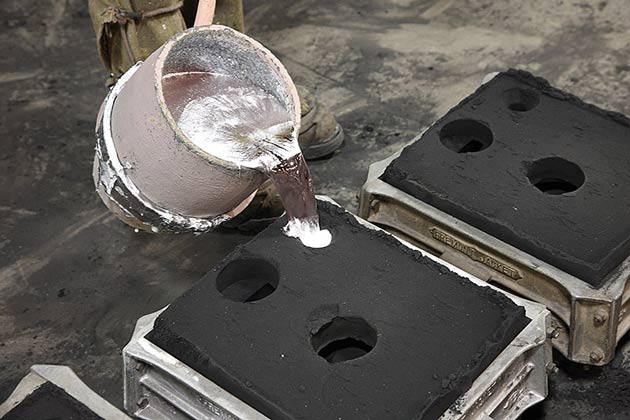Some Known Incorrect Statements About Stahl Specialty Company
Some Known Incorrect Statements About Stahl Specialty Company
Blog Article
The Greatest Guide To Stahl Specialty Company
Table of ContentsThe Ultimate Guide To Stahl Specialty CompanyGetting My Stahl Specialty Company To WorkSome Known Details About Stahl Specialty Company How Stahl Specialty Company can Save You Time, Stress, and Money.Everything about Stahl Specialty Company
Chemical Comparison of Cast Light weight aluminum Alloys Silicon promotes castability by minimizing the alloy's melting temperature and enhancing fluidity during spreading. Furthermore, silicon contributes to the alloy's strength and use resistance, making it valuable in applications where toughness is crucial, such as automotive components and engine elements.It also enhances the machinability of the alloy, making it much easier to process right into completed products. In this way, iron contributes to the general workability of light weight aluminum alloys. Copper enhances electric conductivity, making it beneficial in electrical applications. It additionally improves deterioration resistance and includes in the alloy's general stamina.
Manganese adds to the strength of aluminum alloys and boosts workability. Magnesium is a lightweight aspect that supplies strength and influence resistance to aluminum alloys.
Zinc improves the castability of aluminum alloys and assists manage the solidification process during casting. It enhances the alloy's stamina and hardness.
Stahl Specialty Company Fundamentals Explained
Because aluminum-silicon alloys have good spreading homes, high gas residential or commercial properties, basic procedures, and superb deterioration resistance, aluminum-silicon alloys are most typically made use of in the die-casting sector in the house and abroad. At the very same time, aluminum-silicon alloys are additionally fairly very early and extensively identified alloys created and used in die-casting. After constant study and improvement, many of the current global mainstream aluminum-silicon alloys have actually been completed and are absolutely nothing even more than A356, A360, A380, ADC12, B390, and A413.
The primary thermal conductivity, tensile strength, yield toughness, and elongation vary. Select appropriate basic materials according to the efficiency of the target item produced. Amongst the above alloys, A356 has the greatest thermal conductivity, and A380 and ADC12 have the lowest. The tensile limit is the contrary. A360 has the very best return stamina and the greatest prolongation rate.

Stahl Specialty Company Fundamentals Explained
In precision spreading, 6063 is appropriate for applications where intricate geometries and top quality surface coatings are extremely important. Instances include telecommunication enclosures, where the alloy's superior formability permits streamlined and aesthetically pleasing layouts while preserving architectural integrity. In the Lighting Solutions industry, precision-cast 6063 elements create elegant and effective lighting fixtures that call for complex shapes and excellent thermal efficiency.
(https://www.artstation.com/stahlspecialc1/profile)
It causes a finer surface coating and far better corrosion resistance in A360. Furthermore, the A360 shows premium prolongation, making it perfect for complicated and thin-walled elements. In accuracy casting applications, A360 is fit for industries such as Consumer Electronics, Telecommunication, and Power Devices. Foundry. Its boosted fluidity enables intricate, high-precision components like smart device cases and communication gadget real estates.

In accuracy spreading, light weight aluminum 413 shines in the Consumer Electronic Devices and Power Tools industries. This alloy's remarkable rust resistance makes it an outstanding selection for exterior applications, making certain durable, durable items in the mentioned industries.
Some Ideas on Stahl Specialty Company You Need To Know
The light weight aluminum alloy you choose will considerably influence both the casting process and the buildings of the last product. Because of this, you should make your decision meticulously and take an enlightened approach.
Establishing the most appropriate light weight aluminum alloy for your application will suggest evaluating a large variety of qualities. The initial classification addresses alloy characteristics that influence the production procedure.
The alloy you select for die casting directly affects numerous facets of the spreading procedure, like exactly how very easy the alloy is to deal with and if it is vulnerable to casting defects. Hot fracturing, additionally called solidification splitting, is a regular die spreading flaw for aluminum alloys that can cause internal or surface-level tears or cracks.
The Definitive Guide to Stahl Specialty Company
Specific light weight aluminum alloys are a lot more vulnerable to hot splitting than others, and your option must consider this. One more usual flaw found in the die casting resource of aluminum is die soldering, which is when the actors stays with the die wall surfaces and makes ejection tough. It can harm both the actors and the die, so you must seek alloys with high anti-soldering buildings.
Deterioration resistance, which is currently a significant attribute of light weight aluminum, can vary significantly from alloy to alloy and is a crucial characteristic to think about depending on the environmental conditions your item will be exposed to. Put on resistance is one more property commonly looked for in light weight aluminum products and can separate some alloys.
Report this page